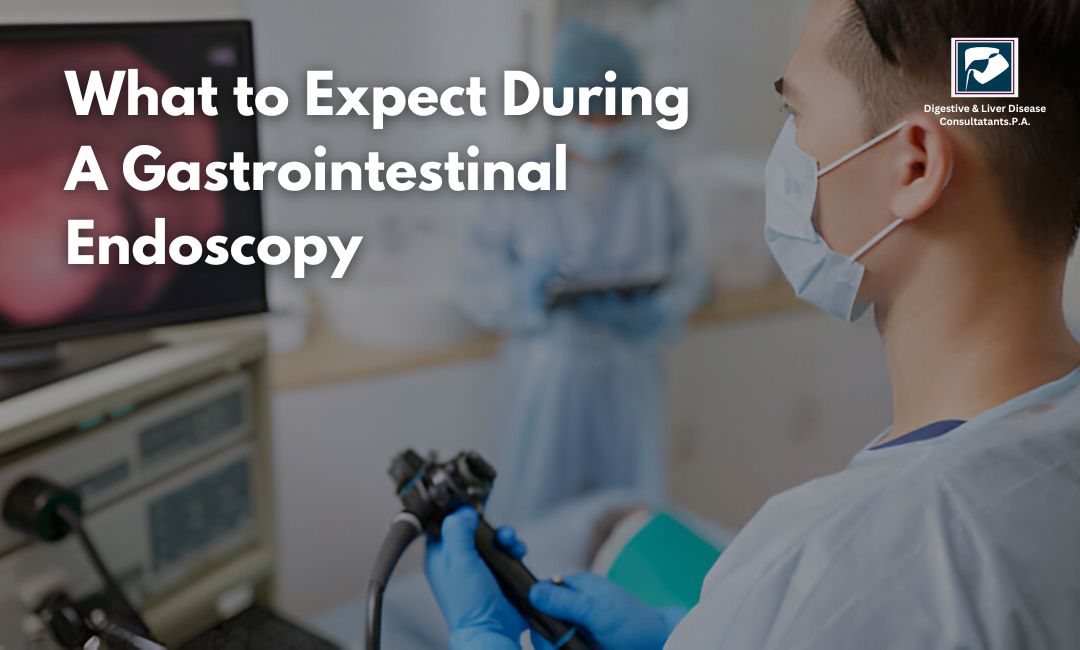If your doctor has recommended a gastrointestinal (GI) endoscopy, you might feel a little anxious or unsure about what the procedure involves. Understanding what happens before, during, and after an endoscopy can help ease your concerns and prepare you for the experience. At Digestive & Liver Disease Consultants, P.A., we want our patients to feel informed and comfortable every step of the way.
In this blog, we’ll walk you through what to expect during a gastrointestinal endoscopy, explain why it’s done, and highlight how our expert team at Digestive & Liver Disease Consultants, P.A. provides high-quality care to ensure your safety and comfort.
What is a Gastrointestinal Endoscopy?
A gastrointestinal endoscopy is a medical procedure that allows doctors to look inside your digestive tract using a long, flexible tube called an endoscope. This tube has a tiny camera and a light at the end, which transmits images to a monitor so the doctor can examine the lining of your esophagus, stomach, and upper part of your small intestine.
There are different types of endoscopy depending on the area being examined:
- Upper Endoscopy (Esophagogastroduodenoscopy or EGD): Examines the esophagus, stomach, and first part of the small intestine.
- Colonoscopy: Examines the large intestine (colon).
- Sigmoidoscopy: Focuses on the lower part of the colon.
This blog primarily focuses on upper GI endoscopy but many principles apply across the types.
Why Do You Need an Endoscopy?
Doctors recommend a GI endoscopy for several reasons:
- To investigate symptoms such as persistent abdominal pain, nausea, vomiting, difficulty swallowing, or unexplained weight loss.
- To diagnose conditions like ulcers, gastritis, celiac disease, Barrett’s esophagus, or infections.
- To screen for cancer or monitor existing conditions.
- To perform minor treatments, such as removing polyps or stopping bleeding.
Preparing for Your Endoscopy
Preparation varies depending on the type of endoscopy, but for an upper endoscopy, you will generally be asked:
- To fast for 6 to 8 hours before the procedure. This means no food or drinks to ensure your stomach is empty.
- To stop certain medications, such as blood thinners, temporarily, as advised by your doctor.
- To arrange transportation, as sedation or anesthesia is commonly used, and you won’t be able to drive afterward.
Your healthcare team at Digestive & Liver Disease Consultants, P.A. will give you clear instructions tailored to your needs to ensure a smooth preparation.
What Happens During the Procedure?
On the day of your endoscopy, here’s what to expect:
Arrival and Check-in: You will check in at the clinic or hospital. Staff will review your medical history and answer any last-minute questions.
Sedation: Most patients receive sedation or light anesthesia to help them relax and minimize discomfort. You will stay awake but feel drowsy and calm.
Positioning: You will lie on your left side on an exam table.
Local Anesthetic: A spray or gel may be used to numb your throat to reduce the gag reflex.
The Endoscopy: The doctor gently passes the endoscope through your mouth, down your throat, and into your stomach and small intestine. You may feel some pressure or mild discomfort but no pain.
Examination and Possible Biopsy: The doctor carefully examines the lining for any abnormalities. If needed, small tissue samples (biopsies) may be taken for further analysis.
Duration: The entire procedure usually takes 15 to 30 minutes.
What Happens After the Endoscopy?
After the procedure:
- You will be monitored for a short time until the sedation wears off.
- You might experience mild throat soreness, bloating, or gas due to air introduced during the exam.
- Most patients can go home the same day but will need someone to drive them.
It’s best to rest for the remainder of the day.
Your doctor will discuss initial findings with you and arrange follow-up appointments if necessary.
Possible Risks and Complications
Gastrointestinal endoscopy is generally safe, especially when performed by experienced specialists like those at Digestive & Liver Disease Consultants, P.A. However, as with any medical procedure, there are small risks:
- Bleeding, especially if a biopsy or treatment is performed.
- Perforation (a tear in the digestive tract lining), though very rare.
Reaction to sedation.
If you experience severe abdominal pain, fever, vomiting, or heavy bleeding after the procedure, seek medical attention immediately.
Why Choose Digestive & Liver Disease Consultants, P.A.?
At Digestive & Liver Disease Consultants, P.A., we are committed to providing compassionate, expert care for all your digestive health needs. Our board-certified gastroenterologists have extensive experience in performing GI endoscopies with the latest technology and techniques to ensure accurate diagnosis and patient comfort.
We prioritize personalized care, taking time to explain each step and answer your questions. Our goal is to make your procedure as smooth and stress-free as possible while delivering the highest quality medical care.
Conclusion
A gastrointestinal endoscopy is a valuable and common procedure that helps doctors diagnose and treat digestive conditions effectively. Understanding the process—from preparation to recovery—can help you feel more at ease if you need to undergo this test.
If you're experiencing persistent digestive symptoms, consult our best gastroenterologist at Continental Hospitals today for expert care.






